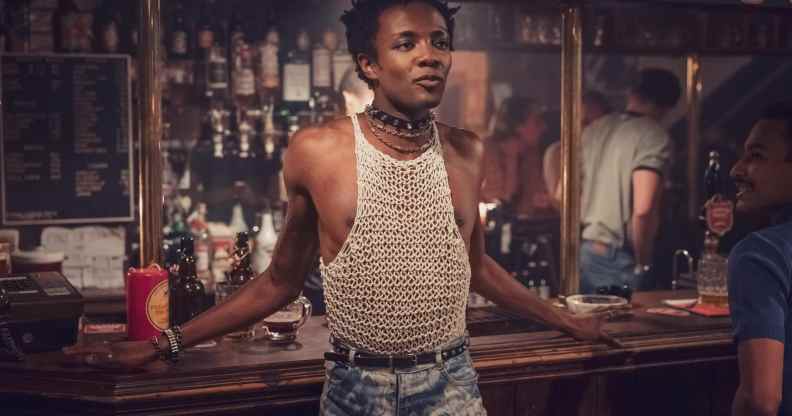Black, British LGBT+ people deserve to be seen on screen in all our glory

Omari Douglas played Roscoe in It’s a Sin, a rare example of a Black, British LGBT+ character in a mainstream TV series. (Channel 4)
Nana Duncan, one-half of the Two Twos Podcast, writes for PinkNews about how Black, British LGBT+ people deserve better in TV and film.
Growing up, I didn’t see anyone that looked like me on TV: dark-skinned and masculine. I craved representation because I craved validity. I did not realise how important visibility was until I got older, realising it factored in my fear of coming out. I believe that seeing yourself is critical in the journey of self-love.
Film has arguably one of the biggest impacts on society and therefore needs to be representative, but there is a notion that Black stories do not have an audience. It is a quiet one, said to Black creators in pitch meetings. I have heard this from Black writers countless times.
The UK film industry rarely commissions Black stories because they do not believe that our stories have an audience, and I find that astonishing. Black people are the drivers of culture, and we deserve to be represented. The only stories they seem to commission are the ones about gang violence to further perpetuate the falsehood that is Black on Black crime.
It is crucial that we explore alternative narratives to represent the multitude of nuanced Black experiences in our society. Being a womxn is one thing, being Black and British is another. My queerness adds another dimension to my identity. I am not Black before I am queer, I am not queer before I am Black, I am a queer Black British womxn.
There are so many layers to explore but it is this intersectionality that is often left out of stories. Where do Black British LGBT+ people go to see themselves? This is the reason I started my podcast, Two Twos Podcast, with my best friend Rosie Frimpong. The reaction from Black British queer people is what keeps us going – our podcast makes them feel seen.
Black British LGBT+ people exist in different forms, and we should be depicted in all our glory. We should not have to struggle to see ourselves in film and TV. We deserve to see ourselves through art because we are art, we deserve to see ourselves as superheroes, we deserve to see ourselves in love, and being loved.
I am exhausted of the over-explored genre that is Black trauma because it is mentally draining. If art is a medium we access to escape reality, it is not doing the job. It is time to adjust our lens and focus on universal stories from the Black perspective.
In the last 10 years, we have seen a progressive shift. We are seeing more Black characters and Black queer characters, however, the focus is usually their Blackness or their queerness.
Often, the queer stories that we do see are coming of age and coming out stories. While they are necessary, it is also important to see queer people in healthy relationships with family and romantic partners, experiencing the same things our straight counterparts, being loved, being supported, as human begins, on a human level.
View this post on Instagram
For me, it was important to write a story about a Black queer woman, where the focus isn’t her queerness or her Blackness. My short film, Losing Joy, is a story about a young woman who struggles to deal with her grief and just so happens to be Black.
It’s isn’t necessarily Black pain, or Black trauma, it’s a universal pain from the perspective of a Black queer woman. Ultimately Losing Joy is about mental health, which we all have, and it’s about loss and love, which we have all experienced.
Black and Black queer creators have so many stories to share with the world, however, we are being ignored and overlooked because there is a glass ceiling.
For a long time, I was plagued with imposter syndrome. I did not see many faces that looked like mine. As a working-class Black British queer woman, I felt out of place and I almost gave up on writing. I recently read an article with the headline: “Majority of UK screen workforce from privileged backgrounds survey finds.”
It wasn’t surprising, but it was nice to see it quantified because oftentimes, I made myself believe that the industry was based on meritocracy and that I just had to work harder.
The truth is we don’t have trust funds, we don’t have generational wealth. So we graft and rise to the occasion every time and it is so hard. I don’t want it to be this hard for the next generation. I cannot afford to wait for the industry to tell me that I am good enough, I have to believe that I am good enough.
I made my first short with £1,000; I had to ask for a lot of favours. There are so many creatives willing to work on a quid-pro-quo basis, we cannot afford to pay one another because there is no funding. We ought to not only see ourselves on screen through an array of stories, but we also deserve to be compensated appropriately, for our contribution to art.
I have to validate myself, I cannot wait for someone to give me a seat at the table. I have to build my own table.

